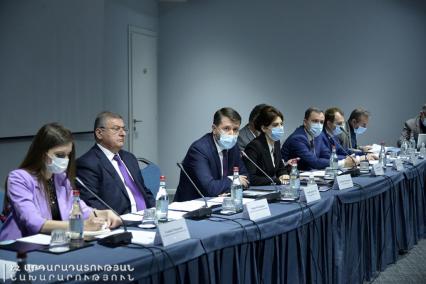More than five dozen interested parties discuss legal opportunities for carrying out vetting of judges
02/11/2021

A professional discussion on transitional justice, integrity issues and the legal opportunities for carrying out vetting took place today in Yerevan with the participation of more than five dozen interested parties.
Deputies, Ambassador Extraordinary and Plenipotentiary of the Republic of Lithuania to Armenia Inga Stanytė-Toločkiene, representatives of the Ministry of Justice, members of the Supreme Judicial Council, a member of the Corruption Prevention Commission, a representative of the Prosecutor General's Office, as well as representatives of the Office of the European Union in Armenia, the Embassy of the Russian Federation in Armenia, the Council of Europe Office in Yerevan and the co-ordinator of the OSCE local project participated in the discussion. Civil society representatives, academic lawyers, representatives of law firms, public and political figures and others also participated in the meeting.
Minister of Justice Karen Andreasyan explained such multilateral representation with the topicality of the topics of vetting, judicial reforms and emphasised that the aim of the meeting is to put an end to the discussion on "how and when there will be vetting in Armenia" that has been “tired out” for nearly three years . "A group of specialists find that the current Constitution allows carrying out vetting through a separate law, a separate mechanism, and another group of people find that it is impossible to carry out vetting based on the current Constitution. Today we will also discuss the opportunities to consider a longer period of time for implementation of transitional justice and integrity checking of judges,” Karen Andreasyan stated and voiced hope that they will receive the answers to those questions when the discussion is summed up and will eventually let the public know "whether vetting will take place before or after the constitutional reforms". In this context, the Minister of Justice stressed that vetting has already begun thanks to the absolutely objective work of the current staff of the Supreme Judicial Council. "I still believe that the vetting process has begun, is in progress, we see the results of vetting on a day to day basis, but we must also understand whether or not we need a separate legislative mechanism to carry out vetting,” Karen Andreasyan concluded.
Acting Chairperson of the Supreme Judicial Council (SJC) Gagik Jhangiryan expressed his satisfaction with the assessment of the Council's activities and emphasised that the SJC envisions its task in not only imposing or not imposing punishment against particular judges, but wishes to take decisions which may be prevent the commission of possible violations in the future. "In this regard, I believe that our decisions, to a certain extent, lean towards the logic of case law, if it is safe to use this word,” Gagik Jhangiryan emphasised.
Deputy Director for Programmes for Open Society Foundations — Armenia Davit Amiryan highly appreciated the change in the attitude of the judiciary towards the idea of vetting, emphasising that vetting is considered as a priority arising from public benefit. "We, non-governmental organisations, continue to believe and hope that the idealistic wishes and notions about the process of vetting will systematically become a reality,” Davit Amiryan stated.
During the professional discussion, speeches were delivered by member of the Corruption Prevention Commission Mariam Galstyan, Deputy Head of the Department for Organization, Supervision and Legal Assistance of the Prosecutor General's Office, Karen Amiryan, member of the Supreme Judicial Council of the Republic of Armenia Davit Khachaturyan, President of the Helsinki Citizens' Assembly-Vanadzor Office NGO Artur Sakunts on the following topics, respectively: "Integrity Checking: Achievements and Prospects for Improvement", “Study on Integrity in the Prosecutor's Office", "Possible Prospects for Implementing of Vetting in the Republic of Armenia" and "Transitional Justice".
Afterwards, three separate working groups for transitional justice, integrity issues and the legal opportunities for vetting were set up during the professional discussion.
Summing up the group discussions, the following was proposed:
The component of transitional justice should not be viewed in isolation, but in general — along with vetting.
Preparatory work should be carried out with the public in order to have a picture of what mandate the Truth Commission will have, what function the Truth Commission will perform so that it also opens opportunities for co-operation with the public with that function.
Not only judges, but also prosecutors and investigators should undergo integrity assessment and take psychological tests.
The opinion that the Corruption Prevention Commission gives when appointing a person to a position should change from being advisory; the culture for adoption of reciprocal decisions between constitutional bodies should be enhanced.
It is reasonable to carry out vetting within the scope of the existing Constitution, even though planning for amendments within the scope of constitutional reforms alongside that is not ruled out either. In case of setting additional incompatibility conditions under the existing Constitution, it is possible to implement this process by establishing a legislative framework. It will become possible by setting up an independent state body; guarantees for independence should be envisaged, the body needs to be established by the National Assembly, be composed of lawyers, human rights activists civil society representatives who are in good standing in public. The Commission should, in essence, implement a universal checking procedure based on the criteria prescribed by law, provide counselling and submit its proposals to the SJC. Examination of petitions should be carried out through an open-door session, with wide involvement of the mass media, etc.
Let us mention that the professional discussion entitled "The course of judicial reforms in post-revolutionary and post-election Armenia" was organised by the Ministry of Justice, with the support of the Partnership for Open Society Initiative.

























